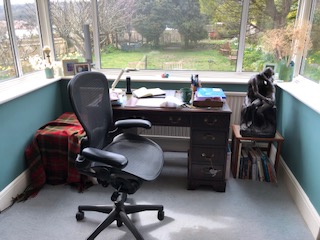All my life, I have been a teacher, from my late teens giving conversational English lessons to European students in the summer holidays to the present. I have taught every aspect of my subject: basic literacy, university literature surveys, creative writing and all the British English exam courses. And it has been a privilege.
Teaching is more a vocation than a profession, since to do your job well, you must invest much more than your time. Each student is precious and you want them to do their best. You worry about their progress; you worry about their sometimes chaotic personal lives; you worry that you are doing a good enough job. Like the old fashioned report card, teachers often feel that they ‘could do better’.
The upside is that all that preparation, grading and teaching helps young (and sometimes older students) flourish, pass exams and gain confidence.

Teaching is intense. It requires passion and love. It is also exhausting. So now that I am nearing sixty and my health not so great, I think it is time to bring things to a close. My last remaining student finishes in June and then I shall retire.
Time may change me, but I can’t change time
It has been a hard decision. I have always loved teaching and disposing of literally decades of work is emotionally fraught. I have endless files stuffed with notes and handouts. They all need to be emptied: the paper to recycling; the files to the charity shop.

Every so often I come across a handout that I had taken particular care over and am hurtled back to teaching that very lesson. One could easily become maudlin in this enterprise. So much of my life is held in these folders. Should I dispose of them? Yes. Time moves forward, not back. Tempting though it is to keep my files, I realise that their physical presence is a sort of anchor weighing me down and holding me in the past.
Taking the band-aid approach, I ruthlessly rip papers from their sleeves and read as little as possible. As the files empty and the recycling bin fills, a wonderful feeling of lightness suffuses me.

Late middle age is a period fraught with change. Children leave home, niggling health issues appear, and we become acutely aware of our mortality. Yet, in so many ways, these are the golden years when we can finally indulge ourselves a little.
My husband has been doing mountains of research on retirement lately and one of the hardest issues to address is what to do with all that time. Some simply can’t contemplate it and work till they drop. Others relish their freedom only to find that it soon seems empty and slump on the sofa watching daytime TV. Ideally, you want this stage to encompass all the interests that were deferred while working. But it does take some planning.

The Marie Kondo method
When contemplating any change, I find the Marie Kondo method works for me. Does my job, dress, social activity spark joy? If the answer is yes, cherish it. If the answer is no, let it go.
What we do habitually is not always what is best for us and using this simple method can help us sift through what we really value. As we empty our lives of emotional or physical clutter, we give room to new options.
And yes, change is scary. So I am trying to make my changes one at a time.
In fact, they are not so much changes as redirections. One of the things I loved most about teaching was reading – but dissecting books is no longer appealing. Now, I want to enjoy them as the entertainment they were meant to be.
Teachers also have to be permanent students. We research our topics, try to keep up to date and learn alongside our pupils. Here again, I can continue my studies but with a much greater range. I am studying art history, languages and would like to return to my music.
I want to write for pleasure and not for handouts. Teaching has certainly helped hone these skills, but now I want to dedicate them to a different purpose.
Interestingly, my life is coming full circle. Everything I loved as a child: art, stories, music and nature are exactly what I wish to fill my time now. My second childhood begins!
The two-pronged approach
These last weeks, I have discovered that all change requires a two-pronged approach. First, we must assimilate the change mentally. This takes time and shouldn’t be rushed. (Again, asking if it sparks joy will give you an answer if you feel conflicted.)
Second, change comes in its physical form – the throwing away of old files or the rethinking of a room’s layout. While doing the ironing, my husband realised that our lounge could be better arranged. We moved the desk to the window and the chairs to either side of the hearth. The centre of the room’s attention is now the fireplace rather than the TV; my writing area is exclusive to me with the most appealing outlook. Such small changes can yield significant results.

Making the most of my time
Living with a progressive, degenerative condition, I am acutely aware of the limited time available to me to do the things I would like. There are periods, I admit, that I rail against the injustice of it, but mostly this compression acts as a spur. I do not have ‘all the time in the world’. I need to get on. The only time I can rely on is now. And now, after all, is all anyone has.


